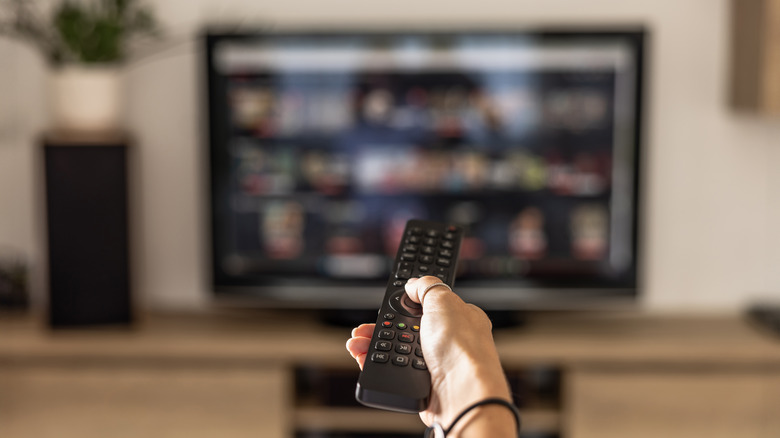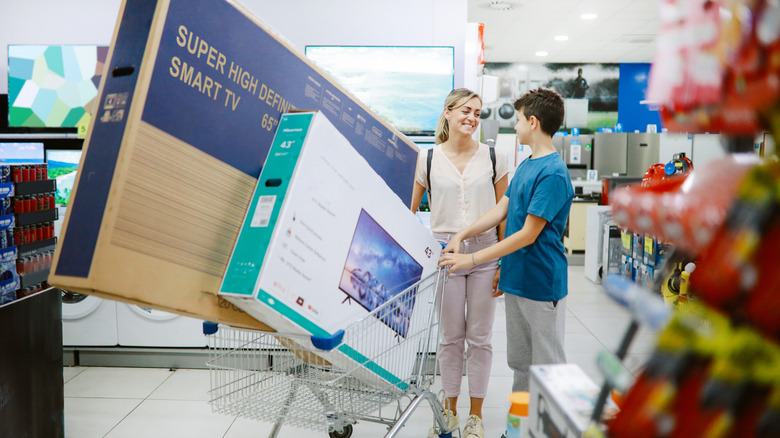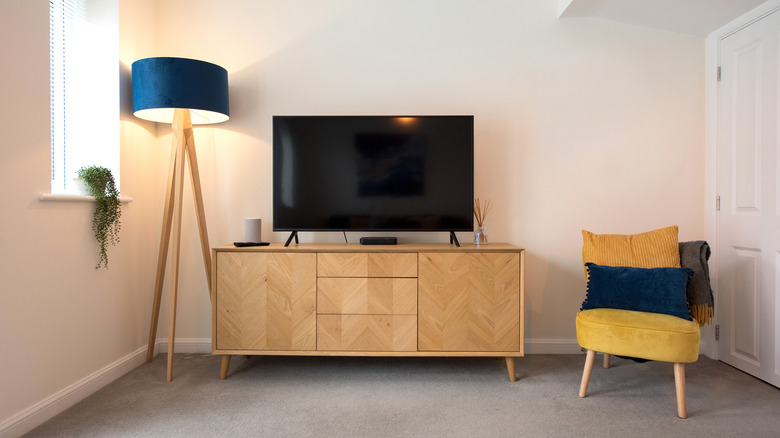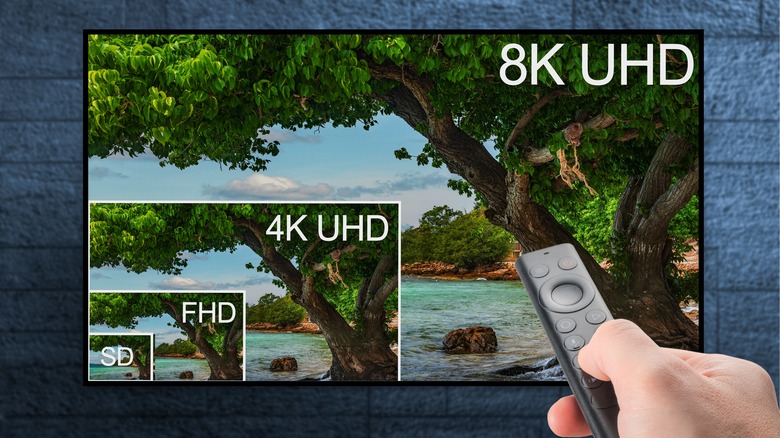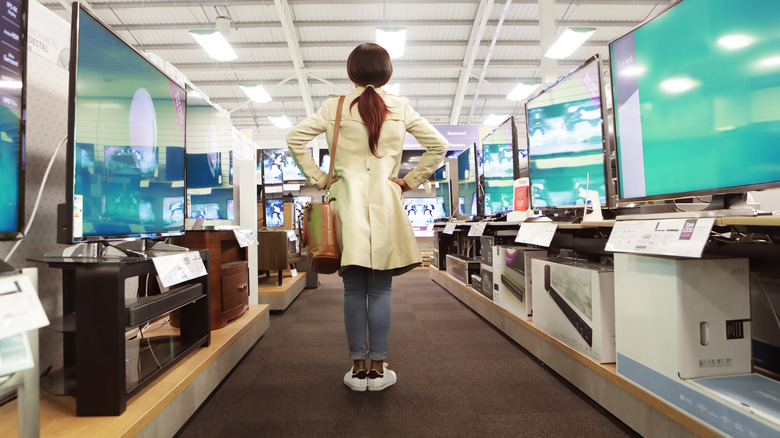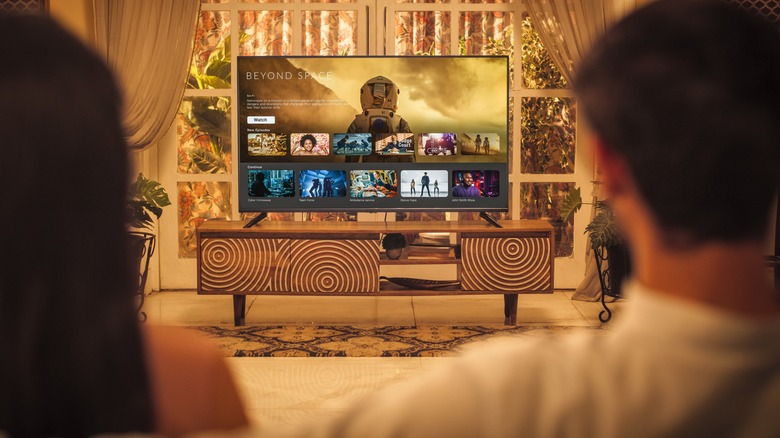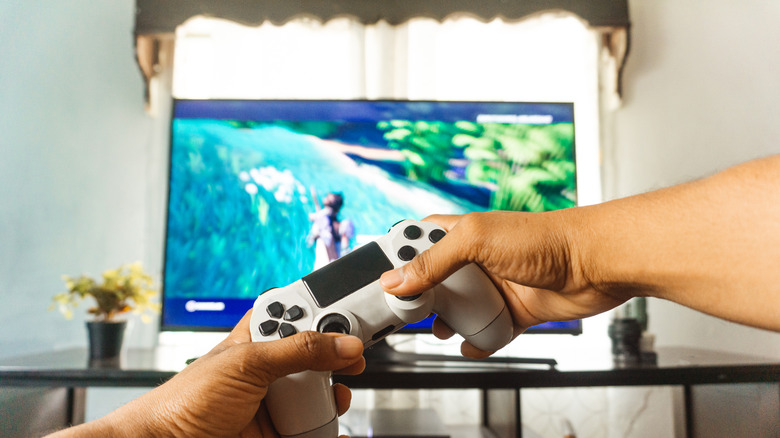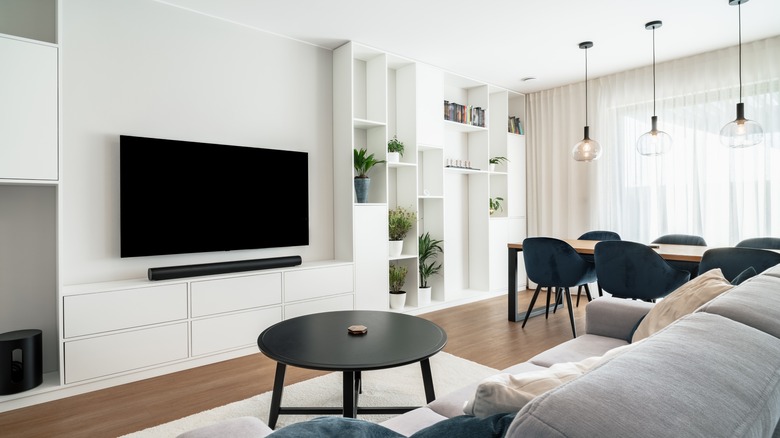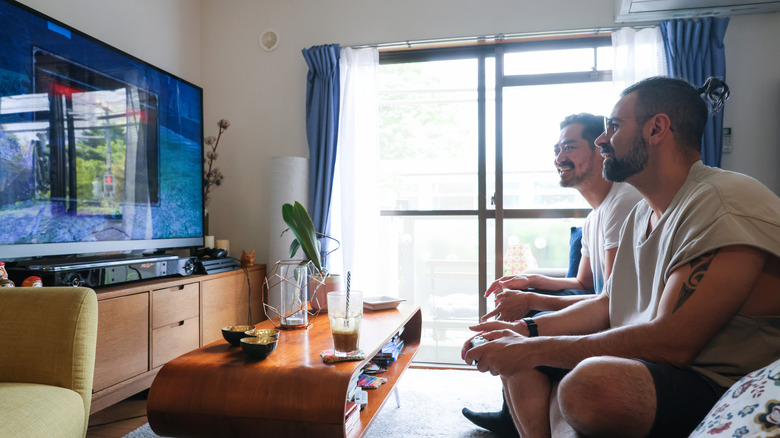The Pros And Cons Of Buying A Cheap TV
The price of everything, from eggs to gas, seems to be going up these days. One would assume the same would hold true for televisions, but the opposite is happening. Television sets remain a consistently affordable appliance that people don't have to spend an arm and a leg to get. Of course, some ludicrously expensive models boast a bevy of features, but if you merely want a TV to stream Netflix on, you can find one for a couple of hundred dollars most of the time.
The exact price point varies widely based on size and the kind of display it has, whether it's LED, LCD, OLED, or QLED. It always helps to consider your needs and to look up reviews to find the best budget-friendly TVs that cost less than $500. As you browse through a pantheon of options, you may see some models that cost significantly less than the rest. You may even want to get a used TV to save even more, and as you look at the price, you may be reminded of the old adage, "You get what you pay for."
There's no point in buying a TV you'll be unhappy with just to save a little money. It's worth remembering the pros and cons of buying a cheap TV so that you can make an informed decision and get the best television possible for your household.
Pro: Affordability
The most obvious advantage to buying a cheap TV is that it'll be super affordable. However, even a $500 TV may be out of range for some consumers. If you look at some of the more budget-friendly TV brands, like TCL and Westinghouse, you'll likely find more affordable products than what you can get out of something like Samsung. And if you're only looking for a small TV, like 32 inches or smaller, you may wind up spending under $100.
Yes, buying a one-year subscription to Disney+ could cost you more than the TV you'll watch it on and hopefully have for a while. The best part is you can probably find a new TV that's in your price range at your local Wal-Mart or Best Buy. You can absolutely find resellers online for even cheaper options potentially, but you need to conduct due diligence.
Most people will sell a used TV for about 80% to 90% of retail price. More importantly, you'll want to see what the TV's actually capable of before buying it. That means checking out the picture and sound quality to ensure it's still viable. Some people will sell a used TV simply because they're upgrading or moving and need to get rid of it, but if a deal sounds too good to be true, it probably is.
Con: Limited features
When some people buy a new TV, they want all of the bells and whistles as well as the strongest picture quality imaginable. All of that is going to set you back even further when it comes to price, so if your budget isn't super high, you may miss out on quite a bit. It's worth it to consider how much of a cinephile you truly are and whether you'll get the most enjoyment out of a more vibrant piece of technology.
A lot of people may not even consider a TV's refresh rate, but it's critical in some circumstances. For example, many basic TVs feature a refresh rate (the number of times per second a TV updates with new images) of 60 hertz, meaning it updates 60 times per second. However, more advanced televisions now come with refresh rates of 120 Hz, and having your TV update twice as much is preferable when gaming or watching sports. That higher refresh rate is typically reserved for more expensive TVs, so that's something you might miss out on by going cheaper.
Some TVs also come with AMD FreeSync, which is also beneficial for gamers who want to reduce things like screen tearing. For the best gaming experience possible, a cheap TV may not cut it, necessitating a massive upgrade.
Pro: Basic functionality
While some people want every feature under the sun, others simply need a TV. When all you want to do is watch a few shows every now and then, getting into things like resolution and connectivity technology are moot points. You can simply connect your TV to an antenna to get local channels, and there are even ways to get free channels on a Samsung TV without an antenna at all. Smart TVs already allow you to access streaming apps, but you can purchase a streaming stick from Amazon or Roku to access those apps independently.
But maybe connecting to an antenna or getting cable is all you want. It may even be the preferable option if you plan on putting your television in a garage where internet access could be spotty. You could simply want something to put over a workbench where video and sound quality aren't of the utmost importance.
All of this is to say you can do a lot on a cheap TV. If you know for a fact you won't be using your TV too often, you can even look into models that came out in prior years. Why purchase something with all the latest widgets when something from last year will cost significantly less?
Con: Poorer picture quality
Some people want the experience of going to a movie theater right in their living rooms. Those folks will want to consider every type of TV set because the picture quality can vary quite a bit.
A major difference between LED and OLED TVs comes with brightness and contrast. OLED options literally turn off certain pixels so that you get a much deeper black on your screen. Plus, OLED options tend to be thinner and more lightweight than other types of TVs, so you might find it easier if you plan on mounting your unit to the wall. All of these first-rate features mean OLED TVs will cost substantially more than LED alternatives, but that doesn't mean OLED is right for you. Anyone who doesn't particularly care about the absolute best picture quality would probably do just fine saving a few hundred dollars on something else.
That's just two options out there. It's also worth looking into the differences between OLED and QLED TVs, the latter of which features a quantum dot layer that produces more vibrant colors than what you get out of a standard LCD system. On the lower end of the scale, either of these will cost closer to $1,000, with some OLED models going for over $2,000. They're not cheap, but it might be the only way to go when you value picture quality.
Pro: Going used opens up larger sizes
We've spoken a little about the important things to remember when buying a used TV (or purchasing any used electronics for that matter). That doesn't mean you should discount it entirely, as seeing what's used may open you up to a greater variety than you may realize.
One factor that heavily impacts any TV's price is its size. This makes sense, and you may find yourself compromising on how big to go, even if a smaller TV would look ridiculously tiny when sitting on your living room's entertainment system. If you really want something in a certain size, it may be worth it to see what's used near you. Even if you don't feel comfortable buying from some random person you find on Facebook Marketplace, you may feel a bit more at ease perusing used options at a reputable chain store.
For instance, Best Buy has open-box deals where someone purchases an electronic, opens the box, and then returns it for whatever reason. Best Buy sells these items, including televisions, at a reduced cost, meaning you can reap the benefits. You can purchase used Best Buy items online or check out your local store to see what's available. A 55-inch TV that normally sells for $350 may only go for $220 for one of these deals, so you stand to save quite a bit by thinking outside of the box.
Con: Reduced lifespan
There are some telltale signs your TV is on its last legs, such as HDMI ports acting finicky. Most TVs are built to last between five and seven years, and if you really take care of yours, you may be able to get it to last a full decade. A 10-year span encompasses multiple generations of evolving technology, so it's probably a good time to upgrade regardless. However, if you hang onto your devices until they're on their last legs, you may not get as much out of a cheap TV as a more advanced one.
If you purchase a used TV, the lifespan will automatically take a hit since it's been in commission for a while already. This is another reason why it may be beneficial to buy a refurbished TV from a store like Best Buy. Those electronics undergo a repair process to get them almost as good as new ones, so they should last a little longer.
Naturally, even a brand-new TV with the most advanced technology will only last five years (or fewer) if you don't take care of it. It's recommended to keep your TVs in climate-controlled rooms so they don't get excessively hot. It's also a good idea to turn the backlight down, especially on LED TVs, so they don't use as much power and can last longer.
Pro: Could be better for certain gamers
It goes without saying that many gamers will want the most expensive TV set-up imaginable. This is particularly advantageous for competitive gamers who play online games and need something that will update frequently to avoid lagging behind their competition. However, if you consider yourself more of a casual gamer, maybe even someone who just wants to play old-school games on a Nintendo 64 or something, you can probably get by with a cheaper TV.
It's a far more accessible way to get into gaming than feeling like you need to shell out $1,000 just to have a decent screen. For those wanting to get something for their kids to play video games on, a cheap TV is definitely the way to go. They may not even care all that much about the resolution, and some parents may not even want their kids having any sort of internet access via gaming consoles anyway.
A 4K TV is perfectly suitable for gaming, and in many instances, you can get one (albeit about 32 inches) for a couple hundred dollars. It'll still provide responsive gameplay, and it's prudent to save where you can, seeing how you might spend quite a bit just on the console and some games.
Con: Worse sound quality
Similar to cheap TVs generally having poorer video quality, the sound may not be as good, too. It's perhaps a big reason why so many people have to watch their favorite shows with the subtitles on because they have a hard time hearing what people are saying.
If you're unimpressed with how your new, cheap TV sounds, you have options. You can always purchase a sound bar or extra piece of equipment, but this will eat into your budget and is just one more thing to purchase and set up. There are some affordable surround sound options for budget-conscious consumers, but before you buy anything extra, it's worth it to see if you can make your TV sound better on its own.
Your TV may sound bad because of its location. You may have situated it in a place where something is muffling its internal speakers, so you can't quite hear anything just right. It's also prudent to adjust the bass and treble in your TV's sound settings to see if that helps. Sound is unfortunately just one facet where modern TVs tend to fall short. That flat screen design means there's not much room for speakers, and cheaper options are more likely to suffer.
Pro: Just fine for people not really into TV
Discussions of OLED vs. QLED and sound quality may not even matter to most people. They may not be huge TV watchers, and they just want something to check out the new season of "Stranger Things" once it comes back on. Otherwise, the unit just sits there collecting dust; in which case, it's probably more beneficial to just get the cheapest option imaginable.
A cheap TV is also a great pick for when you need something for a secondary space. Your living room may have a 65-inch OLED that's pristine for movie nights, but maybe you also want a TV for your kid's room or the guest room? Perhaps you want a second TV for your own bedroom that you only watch reruns of "Cheers" on to help you to go to sleep? It's probably not going to get as much use, so you don't need to go all out buying the latest model.
Some people treat watching TV like a competitive sport, constantly bragging about what their TV is capable of. You should never let that impact your own decision-making process; instead, you should get what's right for you.
Con: It may not be worth even saving a little bit of money
For any major electronic purchase, sufficient research is essential, and you may even realize that it's worth it to splurge a little just for greater peace of mind. Some major TV brands don't have a great reputation, but you may consider buying a TV from it anyway just to save a few bucks. However, if you have a spare $100 that can go toward a new TV, you may want to consider simply buying the slightly more expensive option.
A new TV should be exciting. You should feel ecstatic to get it home, install it, and start watching your favorite shows. In many instances, you don't have to spend all that much more for a significantly better TV. Consumer Reports thoroughly investigated different brands and sizes and often found that better TVs were comparable in price to cheaper options. For example, LG was the top brand when looking at 32-inch TVs with an average price of $181. It scored higher in quality compared to Vizio, which actually cost more on average than LG.
If you can manage to hold off on buying a TV just this second, you may find some deals, like for Black Friday, to save even more on high-quality TVs. A cheap TV is an attractive proposition, and cheap doesn't always mean poor quality. Do your research so that you get what's right for your habits.
